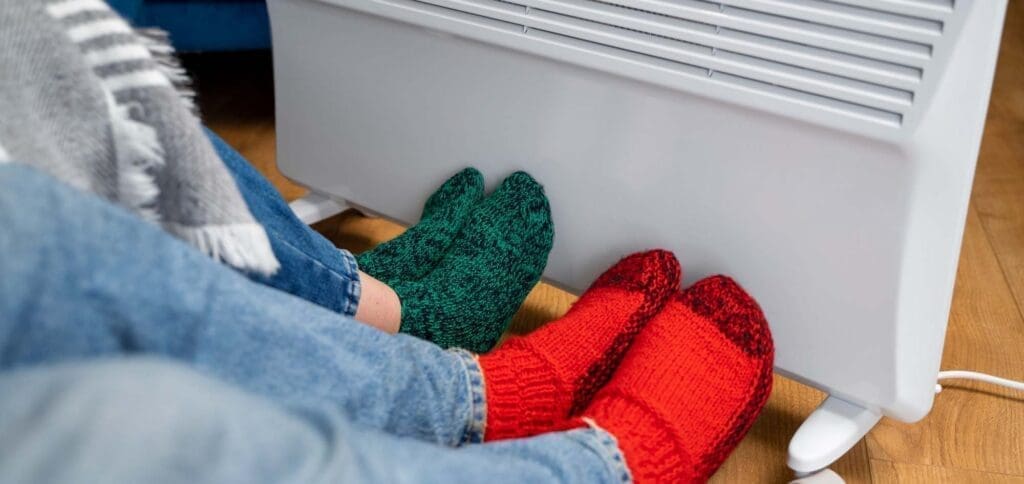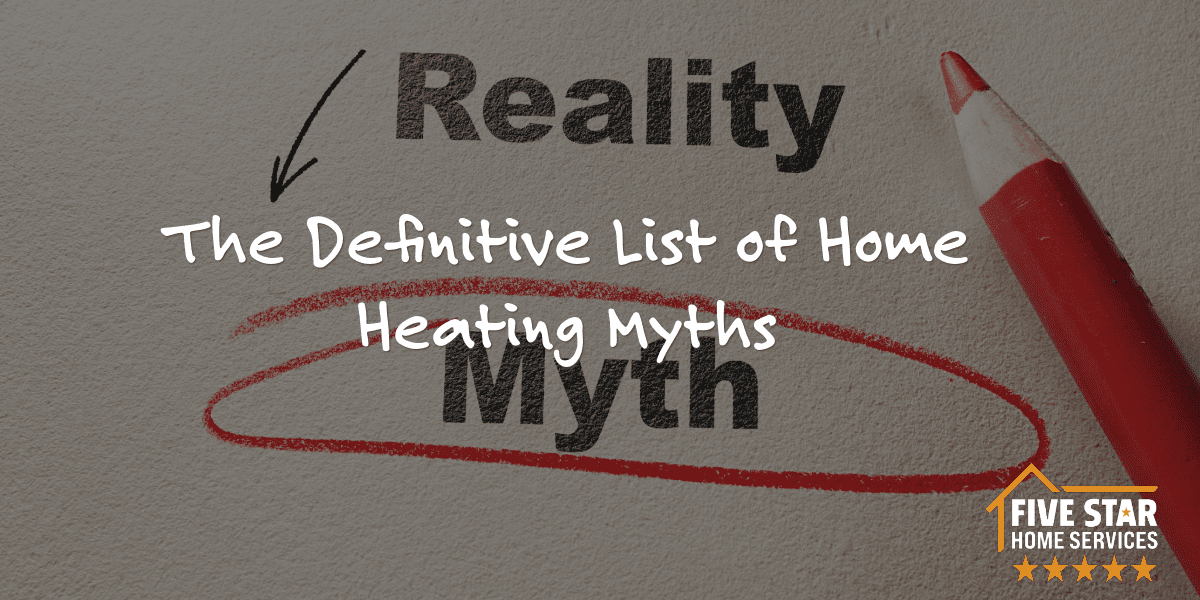Your friends at Five Star Home Services will now bust some home heating myths to help you prepare for winter while getting the most out of your furnace, heat pump, and other HVAC equipment.
The Most Common HVAC Heating Myths
In today’s age, we live in a complicated world with a lot of misinformation out there.
There’s propaganda and agendas around every corner. So-called “fake news.” Conspiracy theories. Half-truths. The list goes on.
Five Star Home Services is an HVAC company, in addition to plumbing and electrical work, so we unfortunately can’t combat all of it. Nevertheless, here in our little corner of the internet, we do what we can.
Because of that, this is the second part of our “MythBusters” series. We probably can’t call it “MythBusters” for copyright reasons. Nevertheless, the intent is the same: We’re here to bust some HVAC myths.
We are in homes every single day and we are always helping people get a better understanding of the HVAC industry. Because HVAC equipment is something people rarely think about in their day-to-day lives, a lot of misconceptions exist about how it works and how to get the most out of it.
Unlike a lot of lists that are content giving Yes/No, black & white answers, some myths are rooted in a kernel of truth. Because of this, we will begin taking a closer look at a few of them to explain what parts are actually true and what is false.
Having said that, if you know of any other commonly misunderstood aspects of home heating that aren’t listed here, please do let us know! If our HVAC experts can verify it, we will add it to the list below.
Myth: Setting my thermostat higher, will heat up my house faster.
Fact: Reputable HVAC installers perform a Manual J Load Calculation for your HVAC system, which determines the proper sizing and power for the equipment. This means that your furnace operates at a certain BTU (British Thermal Unit) level, which is designed to heat your entire house the most efficiently.
This means if you want your home to be 72 degrees and it’s currently 65 degrees, it is going to heat to 72 at the same speed regardless of the temperature. This is a good thing; having a heating system that’s too powerful for your home is inefficient for a whole list of reasons.
In certain situations, if you have multi-stage equipment, your home may heat slightly faster because it will go from single-stage to multi-stage more quickly. Nevertheless, the difference is marginal and will only be true of certain types of heating equipment.
Myth: It is more cost-effective to leave my furnace on at the same temperature all day, whether or not I’m at home.
Fact: We suggest adjusting the temperature to about five degrees when you’re not home, which will help you to save on energy costs while also helping you to prevent the overworking of your HVAC system with frequent on/off cycling, or short cycling. Using the programmable settings on your thermostat (or installing a smart thermostat) can also help you to avoid long periods of discomfort as your furnace adjusts to the new temperature settings when you get back to your home.
Myth: I can use a wood stove, space heaters or fireplace to replace the heat of my HVAC system.

Fact: Although there is a milder version of this statement that has some truth to it, nothing replaces a furnace. Space heaters, wood stoves and fireplaces can provide a modest amount of heat. Wood stoves are the best of the three. If you have a space heater for, say, a private office or are using the fireplace for when you have company and they’re all in a couple rooms of the home, they can be good temporary sources of heat.
What they are not able to do, however, is replicate the whole-home heating comfort of an HVAC system. Even powerful space heaters will be situational, at best. Keep in mind they aren’t any cheaper in terms of energy usage. Rather, space heaters are one of the most inefficient methods of heating available in terms of costs. Fireplaces can also be situationally useful. However, you need to be able to tightly seal chimney flues when not in use to prevent the siphoning of energy from the home at alarming rates.
Myth: Windows and insulation matter more than the type of heating system because so much heat can escape from them.
Fact: Certainly, windows do matter. The same is true for insulation. However, your HVAC system is also very important. There isn’t one magical cure-all that accounts for poor quality in the others. If your windows are poor quality, a brand-new HVAC unit will need to work harder to maintain desired temperature levels. Conversely, an old, inefficient HVAC system will still cost you both comfort and cost, even with brand-new, energy-efficient windows.
In general, the best way to think of your home is to see it as a holistic system; Your HVAC system is a large aspect of this system. Whether or not you need new windows more than new HVAC equipment is a conversation best left to you and our HVAC professionals here at Five Star. Ultimately, a home should both maximize comfort and minimize energy costs.

Myth: If warm air rises, why can’t I just heat my basement and allow that heat to travel upward?
Fact: We’ve heard this one a handful of times in the past. Sure, the part about warm air rising is true. Sometimes, HVAC equipment such as whole-home dehumidifiers will get installed in the basement. From there, dehumidifying benefits the entire home. It’s easy to think the same might be true of heating. Although heat does, in fact, rise — it doesn’t rise evenly. You might have walked up or down your stairs and noticed a 5 to 10-degree difference from the bottom to the top of the stairs. This is because the warmer air takes the path of least resistance. This means it rises in the largest airway (in this case, your staircase). The problem is that it isn’t going to be distributed everywhere. You end up with pockets of extreme cold or extreme heat; it’s uneven. An HVAC system, and particularly your ductwork, is designed to keep your home heated evenly. Doing anything less is inviting discomfort.
Myth: My heat needs to be running constantly throughout the wintertime to prevent my pipes from freezing.
Fact: Milder winter days still requiring some indoor heating won’t be at risk of freezing pipes. Additionally, the positioning of pipes inside your home — how close they are to outside walls, and the insulation of your home — all matter when it comes to freezing pipes. Although there is a bit of danger of freezing pipes, especially at freezing temperatures, the exact point at which a home will need to run a furnace constantly will vary. If this concerns you, you should check with one of our plumbers to see about the potential hazard. And if the temperature stays below freezing for days at a time, it’s safest to keep your heat on.
Myth: If I keep vents to certain rooms closed, I can save money.
Fact: Because HVAC systems are designed to heat and cool the entire house, all closing vents will do is create hot or cold spots in your home. The warm and cool air in the home still mixes. However, it does so unevenly.
Let’s say you leave a vent open near the thermostat but close others. Your heating system might shut off a bit sooner because it senses that your home is at the desired temperature. But as the warm and cool air mix in areas with closed vents, it’s going to cause the furnace to shut on and off more frequently.
This can end up having an inverse effect of costing you more in long-term wear and tear on the equipment. This is also different from a “zoned” home — which is set up to heat or cool certain sections independently. Most residential homes with central air are not zoned.
Myth: Heat pumps Don’t work in freezing temperatures.
Fact: Heat pumps are amazing HVAC units that both heat and cool your home depending on the season. They are less efficient as the temperature dips. However, they will continue to work well into freezing temperatures.
With that being said, a heat pump in freezing temperatures needs to be supplemented with a secondary source of heat. This is usually furnace. The point in which a home switches from “heat pump only” to “heat pump plus furnace” varies depending on the equipment. But at that point, however, they will need to work in tandem to keep your home sufficiently heated.,
Myth: I don’t really need annual maintenance because my furnace is running fine.
Fact: Actually, yes you do need annual maintenance. However, this myth exists because your furnace can continue to operate without annual maintenance. The problem is that it will not operate well. The end result of this mentality is that it will cost you thousands of dollars.
While homeowners know they need to replace their filters periodically — the number of items that can become long-term problems in an HVAC system is massive. These things are significantly less likely to become problems with proactive maintenance from a trusted professional like Five Star Home Services.
Being proactive pays! Remember an ounce of prevention is worth a pound of cure. Maintenance isn’t designed to repair things once everything goes pear-shaped. We do repairs as well. However, it is going to be more cost-effective for you to keep your system running smoothly for 15-20 years, rather than crossing your fingers past about year five and hoping for the best.
One additional point we need to make here is the equipment’s warranty. If you ever have an issue with your equipment, your manufacturer will not honor the warranty if it isn’t being regularly serviced. Check your warranty agreement. This language is in there somewhere. So while a system that isn’t maintained can run for a while, the long-term risks far outweigh this fact.
Myth: Fans don’t help in the winter.
Fact: Warm air rises. Because of this, fans can actually help recirculate warm air that has risen to the ceiling. This will be most important in homes with high ceilings, but can have limited benefits in any home.
Having said that, it won’t help your HVAC system in heating your home. However, it can help you to feel more comfortable throughout the day. Fans are always helpful. Remember that!
Myths Into Reality
As your local HVAC experts, we at Five Star don’t list these myths without a good reason. We list them, and correct them, because they all relate to the health of your home heating equipment and the comfort of your home in a very direct way.
We also believe we must educate our customers. Hopefully some of these myths we’ve “busted” for your help. We realize that there are others out there that we did not address here. That’s why we’re always available to meet with you to discuss your questions and options when it comes to quality HVAC equipment.
If you’re ready for that discussion, we at Five Star Home Services are always ready to help! Check out our service areas below or give us a call!
We look forward to hearing from you!

